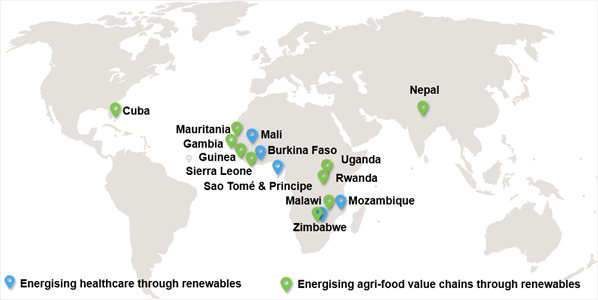About the Initiative
The “Empowering Lives and Livelihoods – Renewables for Climate Action” is a COP28 Initiative, launched by IRENA and the Government of United Arab Emirates, brings together governments, development partners, philanthropies, and the private sector to support catalytic actions and foster result-oriented partnerships for a systematic transformation of the agri-food and health sectors using renewable energy. The overall development objective of the initiative is to stimulate global collaborative action for increased investments for the deployment of sustainable, efficient, and affordable renewable energy solutions for energizing the agri-food chains and health sector, enhancing the lives and livelihoods of especially vulnerable communities. Recognizing the crucial role of women in these value chains, the Initiative puts women at the forefront of actions to inspire progressive changes and ensure greater gender and social equity.
The broader goals of the Initiative are to:
- Improve well-being and livelihoods through decentralised renewables
- Catalyse systematic energy transformation in agri-food, health, and clean cooking sectors
- Improve resilience and productivity in agri-food and health
- Reinforce climate adaptation, with mitigation co-benefits
The Empowering Lives and Livelihoods (L&L) Initiative contributes directly to the 2030 Agenda for Sustainable Development and its commitment to reaching mostly under-served communities. Specifically, it supports the efforts to achieve SDG2 (food security), SDG3 (good health and well-being), SDG 5 (gender Equality), SDG7 (access to clean energy), SDG13 (climate action) and SDG17 (support partnerships). By providing access to energy, improving agricultural productivity, improving health care services, and access to clean cooking solutions, the initiative also helps advance SDG8 (sustained, inclusive, and sustainable economic growth).
Focus Areas
Activities
To achieve its development objectives, the L&L Initiative comprises three (3) main streams of activities:
Countries Supported under the Initiative
IRENA currently supports several countries in sub-Saharan Africa, Asia, and Latin America and the Caribbean, to conduct sectoral assessments and programme development for integration of decentralized renewables in agri-food chains and healthcare facilities in these countries.

Publications

Decentralised renewable energy for artisanal fisheries in Mauritania
Decentralised renewable energy for artisanal fisheries in Mauritania assesses the opportunities and barriers for deploying decentralised renewable energy (DRE) solutions to power Mauritania's artisanal fishing value chain.

Decentralised renewable energy for powering agri-food value chains in Nepal
Decentralised renewable energy for powering agri-food value chains in Nepal assesses the potential for powering agri-food value chains using decentralised renewable energy solutions in Nepal.

Decentralised renewable energy for agriculture in Zimbabwe
Decentralised renewable energy for agriculture in Zimbabwe's agriculture ecstor provide a means to address energy poverty, enhance rural livelihoods, ensure food security, and promote gender and youth empowerment.

Decentralised renewable energy for agriculture in Malawi
Decentralised renewable energy for agriculture in Malawi assesses the potential for integrating DRE solutions into Malawi's agricultural value chains, providing clear recommendations on how these technologies can support the country’s development goals.

Decentralised renewable energy for powering agri-food value chains in the Republic of Guinea
Decentralised renewable energy for powering agri-food value chains in the Republic of Guinea assesses the potential for the integration of distributed renewable energy solutions for in the agri-food sector in the Republic of Guinea.

Electrification with Renewables: Enhancing Healthcare Delivery in Mali
Electrification with renewables Enhancing healthcare delivery in Mali assesses the opportunities for integrating decentralised renewable energy (DRE) solutions to power key health facilities which form the bedrock of Mali’s public health system, delivering primary and secondary level care.

Electrification with Renewables: Enhancing Healthcare Delivery in Zimbabwe
Electrification with Renewables: Enhancing Healthcare Delivery in Zimbabwe provides a roadmap for powering Zimbabwe’s healthcare facilities with reliable and sustainable energy, particularly in remote and underserved areas, via decentralised renewable energy (DRE) systems.

Electrification with Renewables: Enhancing Healthcare Delivery in Mozambique
Decentralised renewable energy offers a reliable, modern and cost-effective solution to the energy access deficit that hinders effective healthcare delivery in Mozambique. Electrification with renewables: Enhancing healthcare delivery in Mozambique proposes financing and business models for the installation and operation and maintenance (O&M) of DRE systems in Mozambique’s healthcare facilities as well as key recommendations to ensure the successful deployment of DRE systems.

Electrification with renewables: Enhancing healthcare delivery in São Tomé and Príncipe
Electrification with renewables: Enhancing healthcare delivery in São Tomé and Príncipe explores the energy-related challenges faced by the healthcare system of São Tomé and Príncipe, providing renewable energy solutions and associated recommendations to improve services and resilience.

Electrification with Renewables: Enhancing Healthcare Delivery in Burkina Faso
Electrification with Renewables: Enhancing Healthcare Delivery in Burkina Faso explores the energy-related challenges faced by the healthcare system of São Tomé and Príncipe, providing renewable energy solutions and associated recommendations to improve services and resilience.











